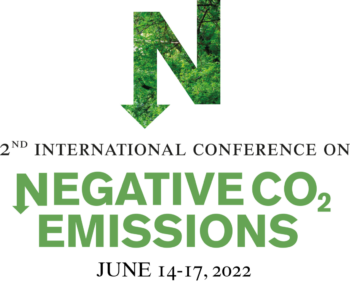2nd International Conference on Negative CO2 Emissions
- BECCS
- Biospheric storage
- Cross-cutting sessions
- Direct air capture
- Enhanced weathering
- Modeling
- Ocean alkalization
For details, please go to the Sessions/Topics tab on the conference website (under Information).
The full programme is available here: http://negativeco2emissions2020.com/wp-content/uploads/2022/06/Program_FINAL.pdf
Background
The objective of the Paris Agreement is to limit global warming to well below 2ºC, and to pursue efforts to limit the temperature increase to 1.5ºC. The carbon budget is the amount of carbon dioxide that we can emit while still limiting global temperature rise to a given level, for example 1.5ºC.
The exact size of the carbon budget is uncertain and depends on many factors, including potential future warming of non-CO2 climate forcers. This said, the remaining budgets for limiting the warming to 1.5ºC or 2ºC have been estimated at about 420 and 1170 Gt of CO2 . With unchanged present emissions at about 40 Gt CO2/year these budgets would be exhausted in as few as 10 and 30 years, respectively. Most of the IPCC emission scenarios that meet a global two-degree target in 2100 overshoot the carbon budget at first and then remove the excess carbon with large negative emissions, typically on the order of 400‑800 Gt CO2 up to 2100.
At the same time as negative emissions appear to be indispensable to meet adopted climate targets, the large future negative emissions assumed in climate models have been questioned and warnings have been raised about relying on very large and uncertain negative emissions in the future. With the future climate at stake, a deeper and fuller understanding of the various aspects of negative emissions is needed.
The purpose of the conference is to bring together a wide range of scientists, experts and stakeholders, in order to engage in various aspects of research relating to negative CO2 emissions. This will include various negative emission technologies, climate modelling, climate policies and incentives.



